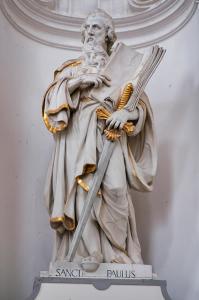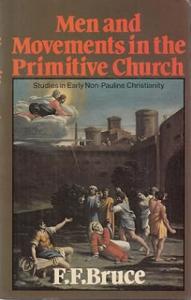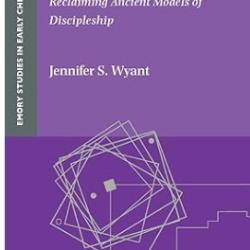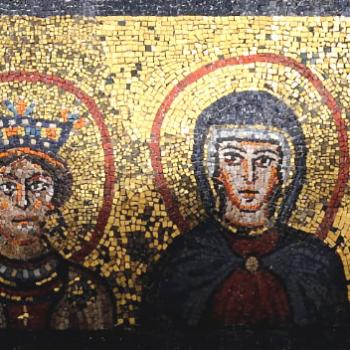Biblical Errors in Pagan Christianity by Frank Viola and George Barna, Part 3
There is nothing in Scripture
to indicate its existence
[the contemporary sermon] in the early Christian gatherings.
(Viola, Pagan Christianity, p.88)

In this edition of “Errors made by Frank Viola” we will look at his critique of Sunday morning preaching.
In addition to the opening statement above, Viola says apostolic preaching was “sporadic…extemporaneous and without rhetorical structure.” (p.88)
In chapter four of his book Viola attacks the Sunday morning sermon as “pagan.”
With such a wide variety of sermons and preaching throughout the Christian world, this criticism is kind of like shooting an arrow without a target – you are assured to hit something!
Unfortunately, Viola was not finished throwing rhetorical bombs:
The Christian sermon was
borrowed from the pagan pool
of Greek culture! p.89
He continues in this section, condemning rhetoric as “pagan.”
rhet·o·ric: the art of effective or persuasive speaking or writing
Practically speaking, I agree with many of Viola’s criticisms.
Have I ever had to endure bad preaching? YES!
But Christians in the primitive church did not write books to sell for the masses on Amazon like Viola…AND, I have read a lot of bad Christian books – like Viola’s. Yet, these facts alone do not condemn writing books as “non-biblical or pagan.”
Sunday Morning Sermons
GOOD or BAD?
As a young man I sat under some excellent preacher/teachers. These preachers had walked with Christ for longer than I had been alive. They had commentaries not readily available to me (in the late 70’s) and they had FAR more life experience to help me better understand the text.
I am grateful for each of these preachers.
Having said that…over the years I have endured countless sermons that went longer than needed…and taught me very little.
But THINK about Viola’s comment that apostolic preaching was:
– sporadic – extemporaneous AND
– without rhetorical structure [-1-]
Did Paul Use Rhetoric?

Paul was in Corinth for around 18 months (Acts 18:11) and he was in Ephesus for over three years (Acts 19:10). Does Viola really think that Paul would only speak sporadically to those congregations? Does anyone really think that Paul was not the main teacher of the church while he was in these cities?
Viola apparently thinks this, but he has NO evidence for his position. It would not surprise me if Paul had others share from time to time, but I would be greatly surprised to find out that he only spoke “sporadically.”
Did Paul always speak “extemporaneously?” No.
It is difficult to imagine that the author of the letter to the Romans would typically speak off the top of his head (ad hoc) to a congregation he had started.
Even if he did speak ad hoc his mind was informed with all that he had studied, learned…and written in his letters. When Paul spoke unprepared he would still have been structured in his delivery – and like Jesus with his parables [rhetorical devices], Paul would have used rhetoric. The whole point of preaching/teaching is to persuade!
Viola has virtually NO evidence that Paul, or any other leader in the first century spoke ONLY sporadically and without a plan or structure.
Paul’s letters were typically written to address specific issues, but they are not without structure and purpose. Paul was a trained scholar.
The only reference Viola really has for a “church” meeting is from Acts (which gives very few details) and 1 Cor 12 and 14. In Acts 20 we read:
“Paul spoke to the people and, because he intended to leave the next day, kept on talking until midnight.
This “church” meeting took place in a large building. It appears that Paul was the main speaker (if not the only speaker), and he went until midnight! THAT does sound like Paul is speaking ad hoc.
The section of 1 Corinthians 12-14 ends with:
“But everything should be done in a fitting and orderly way.” (1 Cor 14:40)
That does not sound like an ad hoc meeting. In addition, chapters 12 and 14 of 1 Corinthians are separated by the Love chapter…which is….
wait for it….
a rhetorical device.
Viola Breaks ALL the Rules
He wants Others to Follow
Viola lays out his theory (pp.89-93) with 32 footnotes claiming that rhetoric is “pagan,” part of the “polluted stream” flowing from Greek philosophy. He should have listened to Ben Witherington when he had his chance [read Witherington’s comments in the previous article], a leading NT scholar of our day. One of his most important contributions has been writing NT commentaries which are subtitled “Socio-Rhetorical” commentaries:
“Paul lived in a rhetoric-saturated environment with only limited literacy. The failure to come to grips with this fact is serious, especially when Greek-speaking church fathers like John Chrysostom knew perfectly well that Paul was following all kinds of rhetorical conventions in his proclamations and his letters. Was Chrysostom imposing rhetorical categories on Paul’s non-rhetorical letters? Absolutely not…Furthermore, we are not talking about something that is incidental, accidental, or of minor import.” [-2-]
Viola’s callout quote to open the chapter is
1 Corinthians 2:4-5 (NIV):
“My message and my preaching were not with wise and persuasive words…”
Viola never comments on WHY Paul says this.
Some of the Corinthians were comparing Paul to Apollos and finding Paul to be a loser as a public speaker. Some had declared an allegiance to Apollos (1 Cor 1:12; 3:4).
Paul respected Apollos and does not want to engage in this competition. [-3-]
The irony here is that Paul’s comment in 1 Corinthians about not using “wise and persuasive words” IS itself a rhetorical device! This apparently slipped by Viola without notice.
Apollos of Alexandria
Trained in Philosophy and Rhetoric
How much does Viola even know about Apollos, the converted Hellenistic Jew from Alexandria?
“A learned man… a thorough knowledge of the Scriptures…he spoke with great fervor…vigorously refuted his Jewish opponents in public debate…” (Acts 18:24-25,28)
Sounds like a man who used rhetoric to me.

Viola has several titles by F.F. Bruce in his bibliography. Bruce is one of my heroes: a tremendously good scholar AND a committed Christian. Noticeably missing in Viola’s biblio (given the focus of this book) is Bruce’s small, but powerful text Men and Movements in the Primitive Church. [-4-]
Apollos is described by Luke with a unique phrase “aner logios…an ‘eloquent man’…agrees with it’s meaning in Hellenistic and Modern Greek.” (p.68) It is likely that “Apollos’s eloquence was contrasted with Paul’s unimpressive delivery or…eschewing of ‘lofty words or wisdom’ among the Corinthians.” (pp.68-69)
Bruce Winter, another excellent scholar states that Luke’s description of Apollos (Acts 18:24-28) “has rhetorical connotations, so that the Acts account of Apollos would have conveyed to the readers that this Christian Jew from Alexandria depended on his rhetorical skills,” and also that “aner logios is an expression used by Philo to describe those who have been trained in rhetoric.” [-5-]
Education and Rhetoric
is NOT “Pagan”
The fact is: MOST of our documented evidence from the primitive church comes from well-educated men who spoke fairly good Greek and were literate. We have very little in the way of extemporaneous messages from the apostolic era. Did it exist? Certainly. Was it the norm for presentation in the house church? There is NO solid evidence to prove this.
My point?
Viola’s comments about “paganism,” rhetoric and the Greek philosophical tradition – making negative comments about various church fathers who had been classically trained – it is clear to me that he has no idea of the positive influence of the philosophical tradition in his New Testament. There are clear philosophical markers in Romans 1-2; in Hebrews we have shades of Platonic thought and indications of sharing ideas from Philo, the Alexandrian Jewish philosopher and theologian. Many solid scholars think Apollos is likely the author of NT Hebrews. [-6-]
The Christian faith inherited the status of being the people “of the writings” from Judaism when only around five percent of the ancient world could read and write. Most scholars think a typical “church” meeting in the first 100 years included one of the few literate people reading a text, then the pastor/teacher would explain the text and answer questions from the congregation. From the earliest days, bishops of the larger cities tended to be some of the most educated in the community.
Christianity has always attracted great minds and highly educated men and women. All of this makes it clear why I was disappointed to read Viola’s charge that polished and eloquent presentations of the gospel with rhetorical structure, and using sophisticated grammar…were signs of being “pagan.”
What is especially ironic to me
is that Viola’s book is structured,
packed with rhetorical device and
is certainly NOT extemporaneous.
– Al Baker
NOTES:
1. Viola cites this author several times in this chapter: David C. Norrington, To Preach or Not to Preach: The Church’s Urgent Question (Paternoster 1996). I read a journal article review of Norrington’s book – the writer had the same arguments I am presenting in this article.
2. Withington, Ben, Paul’s Letter to the Philippians: A Socio-Rhetorical Commentary, (Eerdmans 2011), p.22. You can read most of his introduction on Google books.
3. See Paul’s comments in 1 Cor 3. He refers to Apollos as a “co-worker,” (v9) who watered the soil (v6) AFTER Paul had planted. He names Apollos in the same category as himself along with Peter (v22). Paul urges Apollos to go back to Corinth (16:12); and he urges Titus to supply Apollos with anything he needs (Titus 3:13).
4. Bruce, F.F., Men and Movements in the Primitive Church, (Paternoster 1979). The citations in this paragraph are from this text.
5. Winter, Bruce, Philo and Paul Among the Sophists, SNTS Monograph Series 96 (Cambridge 1997) p.176, especially n143 and n144.
6. F.F. Bruce authored an excellent journal article giving solid evidence for Apollos being the author of NT Hebrews. See Bruce, F.F., “‘To the Hebrews’: A Document of Roman Christianity?” ANRW 25.4 (1987), pp.3496-3521. This is a German journal [The Rise and Fall of the Roman World] known for lengthy articles with far too many footnotes!
 Al Baker
Al Baker
1981 – B.S. Mgt/Marketing (Troy Univ – Alabama)
1990 – Classical Greek (Univ. of Alabama)
2001 – Ph.D. Early Church History (Univ St Andrews – Scotland)
Al has served 20+ years as a pastor (local church and university pastor), was an adjunct then an associate professor of Philosophy and Religion at Saint Augustine’s University in Raleigh NC for six years and as an adjunct for Troy University for a few semesters.
In 2005 he started churchhistory101.com, surpassing 1 million unique visitors in 2016. On that site there are several articles and papers written by Dr. Baker on different aspects of early Christianity and two PDF eBooks you can download:
A Concise History of the Christian Church: From the Apostles to the Council of Nicea 325 A.D. and Christians, War and Military Service: From the New Testament to Emperor Constantine.
“My passion is early Christian history. There is a serious lack of knowledge and understanding of early church history, especially among Protestants. We must realize that the early church, like the modern church, was not perfect.











